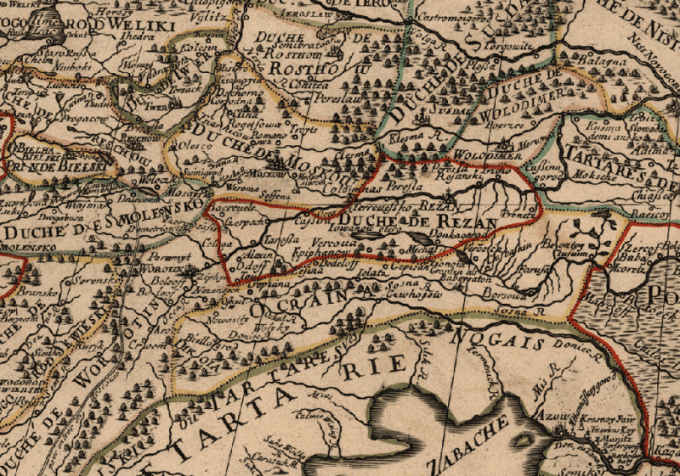At the same time, Russia could wear different names, because the self was different from the notation adopted in other Nations.
The land corresponding to the territory of modern Russia, was described by ancient geographers and historians in the days when there was no question of any state entities. Often these descriptions wore a fantastic character.
For example, the ancient Greek historian Diodorus Siculus wrote about Hyperborea – a mysterious Northern Land. Presumably, this "country" corresponded to the territory of the Russian North. According to Diodorus, the life of the Hyperboreans so carefree and happy that they are thrown into the sea, sated pleasure. Not surprising: people always tend to inhabit fantastic creatures of the land, about which they knew little.
In the 10th century, Arab historians described the three Slavic territory, which they called As-Slavia, with its capital in the city of Salou, Aratina and Cuiabá. Modern historians identify As-Slavia with the Novgorod land, and its capital with the Slovenian city, located not far from Novgorod, and the Cuiaba – Kiev. Unclear is the location of Artania. Presumably, it was located on the territory of modern Ryazan.
In the era of the Vikings the Normans called Russia "a country of cities" – Gardariki. We should not think that in those times in Russia there were a lot of highly developed cities and trading centres like Novgorod in the later era. The word Gardariki it would be better translated as "land of castles".
In Europe in 15-18 centuries, Russia was called Muscovy. However, the so-called Russia not all Europeans, but only residents of the Commonwealth, as well as the Italians and French, who received information from this state.
The most ancient name of the territory inhabited by the Eastern Slavs – Russia. The name is traced back to the name of the tribe Rus, which became the basis of unification of Slavic tribes. Among historians there is no consensus regarding the origin of this people. Some historians believe the Scandinavian Rus ' tribe, others West Slavic, and others elevate this title to the Sarmatian tribe roxolani and Romanov.
At the turn of 15-16 centuries approved another form of the name – Russia. This happened under the influence of Greek literature, and originally this title appeared in the literature.
22 Oct 1721 after his victory in the Northern war Peter I accepted the title of Emperor of all the Russias, and the state gets a new name – the Russian Empire.
So the country was called until 1917. September 1, 1917, the Provisional government declared the Russian Republic.
In 1922 "on the ruins" of the Russian Empire, a new state – the Union of Soviet Socialist Republics (USSR), the center of which is Russia, now called the Russian Soviet Federative Socialist Republic (RSFSR).
After the Soviet collapse in 1991, it was adopted its present name – the Russian Federation.
Antique
The land corresponding to the territory of modern Russia, was described by ancient geographers and historians in the days when there was no question of any state entities. Often these descriptions wore a fantastic character.
For example, the ancient Greek historian Diodorus Siculus wrote about Hyperborea – a mysterious Northern Land. Presumably, this "country" corresponded to the territory of the Russian North. According to Diodorus, the life of the Hyperboreans so carefree and happy that they are thrown into the sea, sated pleasure. Not surprising: people always tend to inhabit fantastic creatures of the land, about which they knew little.
Foreign names
In the 10th century, Arab historians described the three Slavic territory, which they called As-Slavia, with its capital in the city of Salou, Aratina and Cuiabá. Modern historians identify As-Slavia with the Novgorod land, and its capital with the Slovenian city, located not far from Novgorod, and the Cuiaba – Kiev. Unclear is the location of Artania. Presumably, it was located on the territory of modern Ryazan.
In the era of the Vikings the Normans called Russia "a country of cities" – Gardariki. We should not think that in those times in Russia there were a lot of highly developed cities and trading centres like Novgorod in the later era. The word Gardariki it would be better translated as "land of castles".
In Europe in 15-18 centuries, Russia was called Muscovy. However, the so-called Russia not all Europeans, but only residents of the Commonwealth, as well as the Italians and French, who received information from this state.
Self
The most ancient name of the territory inhabited by the Eastern Slavs – Russia. The name is traced back to the name of the tribe Rus, which became the basis of unification of Slavic tribes. Among historians there is no consensus regarding the origin of this people. Some historians believe the Scandinavian Rus ' tribe, others West Slavic, and others elevate this title to the Sarmatian tribe roxolani and Romanov.
At the turn of 15-16 centuries approved another form of the name – Russia. This happened under the influence of Greek literature, and originally this title appeared in the literature.
22 Oct 1721 after his victory in the Northern war Peter I accepted the title of Emperor of all the Russias, and the state gets a new name – the Russian Empire.
So the country was called until 1917. September 1, 1917, the Provisional government declared the Russian Republic.
In 1922 "on the ruins" of the Russian Empire, a new state – the Union of Soviet Socialist Republics (USSR), the center of which is Russia, now called the Russian Soviet Federative Socialist Republic (RSFSR).
After the Soviet collapse in 1991, it was adopted its present name – the Russian Federation.
